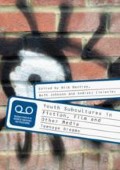Abstract
This chapter will explore how ideas of standardisation and conformity are reflected in the near-future narrative of Peter Watkins’s 1967 feature film Privilege and reflect how such concepts have informed the post-war tradition of British cinema focusing on the machinations of the music industry. Watkins’s explicit linking of the popular music industry with the dominant ideologies of the state (including politics, consumer culture and religion) draws on the ideas of the Frankfurt School, particularly Adorno’s work on popular music and conformity. The chapter will consider how this critique of the music industry focused around the manipulation of the pop superstar is informed by more recent debates about cultural agency and fandom.
Access this chapter
Tax calculation will be finalised at checkout
Purchases are for personal use only
Notes
- 1.
The musician as slave to the industry is usually metaphorical, whilst Brothers of the Head takes this one stage further as the conjoined Howe twins have their lives signed away to an ambitious pop impresario by their unfeeling father.
- 2.
The film’s music, written and arranged by Mike Leander, is a particular strength of Privilege, helping to add to the film’s documentary feel and sense of veracity. Leander most famously arranged The Beatles She’s Leaving Home on their influential Sgt Pepper’s Lonely Hearts Club Band (1967) and went on to write and produce most of Gary Glitter’s chart-topping hits of the 1970s.
- 3.
In one sequence Shorter is asked to change the channel on his wrist bound radio which is playing his latest hit ‘I’ve been a bad, bad boy’ (also a top five hit in the actual UK charts) but he finds that whatever station he tunes into, it is playing the same ubiquitous tune.
- 4.
Some posters for the film and the original soundtrack album depict an image of Steven Shorter represented as a puppet hanging on controlling strings. This design later reappeared as the cover art for the New Yorker DVD release.
- 5.
The initial version of Free Me include the lines;Verse
Verse My spirit’s broken No will to live My body’s all aching My hands are tied I need my freedom Not your sympathy
These are later changed to;Verse
Verse I kneel before Him My time has come O Father, Father Your children call Defend our mothers Forgive us all
- 6.
Again this seems to echo the work of Adorno who stated:
-
In the culture industry the individual is an illusion not merely because of the standardisation of the means of production. He is tolerated only so long as his complete identification with the generality is unquestioned. (Adorno and Horkheimer 1997, 38)
-
- 7.
The British Film Institute Monthly Film Bulletin wrote that
-
‘What hangs around Watkins’ neck is sheer lack of professionalism: his film is a mass of poor scripting, inept acting, and directionless, irrelevant camerawork and editing […] the television-vérité style that Watkins has clung to so obsessively throughout his short career has now reached its ultimate condemnation […] Everything in ‘Privilege’ goes wrong, and one can do little but catalogue the failures [… ] For ‘The War Game’ the technique was just about as hollow, but the film’s subject gave it the compulsive fascination of a nightmare; with ‘Privilege, the result is mere farce’. (Watkins 2016)
-
References
Adorno, T. W. 1990. “On popular music.” In On record: rock, pop and the written word. Simon Frith and Andrew Goodwin (eds.) London: Routledge.
Adorno, T. W. 2001. The Culture Industry: Selected Essays on Mass Culture, London: Routledge.
Adorno, T. W. and Horkheimer, M. 1997. Dialectic of Enlightenment, London: Verso.
Friedman, L. 1983. “The Necessity of Confrontation Cinema: Peter Watkins interviewed” Literature/Film Quarterly, 11.2: 237–48.
Glynn, S. 2013. The British Pop Music Film: The Beatles and Beyond, Basingstoke: Palgrave Macmillan.
Gomez, J. A. 1979. Peter Watkins, New York: Twayne Publishers.
Hall, S. and Jefferson, T. (eds.) 1976. Resistance through rituals, London: Hutchinson.
Jenkins, H. 1992. Textual poachers: television fans and participatory culture, London: Routledge.
Lewis, L. 1992. The Adoring Audience: Fan Culture and Popular Media, London: Taylor and Francis.
Watkins, P. 2016. Peter Watkins: Filmmaker/Media Critic. Available from; http://pwatkins.mnsi.net/. Accessed 15/01/17.
Filmography
The Tommy Steele Story (Hudis UK 1959).
Expresso Bongo (Guest UK 1959).
A Hard Day’s Night (Lester UK 1964).
Privilege (Watkins 1967).
The Gladiators (Watkins SE 1969).
Punishment Park (Watkins US 1971).
Stardust (Apted UK 1974).
Flame (Loncraine UK 1975).
Breaking Glass (Gibson UK 1980).
Brothers of the Head (Fulton & Pepe UK 2005).
Spike Island (Whitecross UK 2012).
Northern Soul (Constantine UK 2014).
Author information
Authors and Affiliations
Editor information
Editors and Affiliations
Rights and permissions
Copyright information
© 2018 The Author(s)
About this chapter
Cite this chapter
Hyder, R. (2018). Youth, Hysteria and Control in Peter Watkins’s Privilege . In: Bentley, N., Johnson, B., Zieleniec, A. (eds) Youth Subcultures in Fiction, Film and Other Media. Palgrave Studies in the History of Subcultures and Popular Music. Palgrave Macmillan, Cham. https://doi.org/10.1007/978-3-319-73189-6_11
Download citation
DOI: https://doi.org/10.1007/978-3-319-73189-6_11
Published:
Publisher Name: Palgrave Macmillan, Cham
Print ISBN: 978-3-319-73188-9
Online ISBN: 978-3-319-73189-6
eBook Packages: HistoryHistory (R0)

